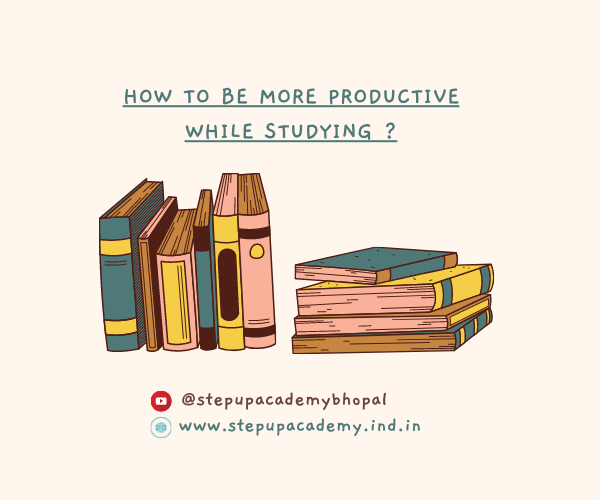Overcoming Exam Anxiety: Tips for Staying Relaxed and Focused During Exams
22-12-2022 13:15
Have you ever felt that you will fail in the exam even after studying everything? Or is your preparation still incomplete? Or will all the hard work you have done till now will waste? Or have you forgotten everything you read? All these thoughts are the symptoms of exam anxiety.
Many students struggle with exam anxiety. If you freeze up in the exam due to anxiety, no matter how hard you work, you will not be able to score good marks.
Symptoms of Exam Anxiety
If you have exam anxiety, you may experience physical, emotional, and cognitive symptoms.
- Physical symptoms: Headache, nausea, excessive sweating, shortness of breath, rapid heartbeat, lightheadedness, and feeling faint. Test anxiety can also cause panic attacks, which are the abrupt onset of intense fear or discomfort in which you may feel like you are unable to breathe or like you are having a heart attack.
- Emotional symptoms: Feelings of stress, fear, helplessness, and disappointment, negative thoughts (rumination about past poor performances, consequences of failure, feeling inadequate, helpless), mind going blank, and racing thoughts.
- Behavioural/cognitive symptoms: Difficulty concentrating, thinking negatively, comparing yourself to others, and procrastinating.
Just a few months away from your board exams, now is the right time to understand how to stay relaxed and focused during the exams. These tips will surely help you stay calm and give your best performance.
- Stay Positive
"If you can stay positive in a negative situation, you win." A little exam stress keeps us energized, motivated, and focused.
But too much stress is a serious matter that often reduces our ability to think and hinders exam performance by promoting negative thinking in the mind. A positive mindset will improve your chances to score the highest marks in the board exams. Make sure your surroundings and mindset both should spread positivity and help you in getting good marks.
Replace all negative thoughts with positive thoughts. For example, instead of thinking about the consequences of performing poorly in the exam, think about what would happen if you clear the exam with great marks. Try telling yourself “I am hard-working,” “I am courageous,” “I can do this,” or “Everything will be okay.” This way you will be able to eliminate negativity from your thinking, have greater mental health, and increase your well-being.
- Avoid Last-minute Cramming
If you have not studied for the whole year and now expect to cover the entire syllabus overnight, then you are already out of the race to score good marks. Last Minute Cramming hinders your sleep, which leads to anxiety, stress, and tiredness. The concepts you study at the last hour of your exam cannot be retained for a longer time. This is because the information is stored in the visual cortex rather than in long-term memory.
If you do not want exam anxiety, study lightly and avoid ranting just a night before the exam. You should sleep well and take rest to stave off any kind of anxiety.
- Have Confidence
The only key to success is confidence and trust in your preparation. Let it be known that you have worked to the best of your abilities and are confident of your preparation. Anxiety can be reduced by taking a deep breath, so use these types of measures. Biometrically deep breathing has been shown to be effective on tasks such as anxiety, overwhelming emotions, and focus.
- Get proper sleep during your preparation
Most of the people compromise with their sleep in the rush to prepare for the upcoming exams. Not taking proper sleep does more harm than good to the body and mind. Thus, sleep is essential to prepare for the exam and ace them effectively. Students should receive the proper amount of sleep each night to help them concentrate better, stay focused, and perform better in class.
- Be Physically Active
Taking regular intervals/breaks while studying helps you rejuvenate. Stretching, going for a walk outside, exercising, meditating, etc are some of the activities that make you stay focused and sustain your energy. These activities are considered good ways to relieve stress. It not only refreshes your mind for some time, but it also fills you with freshness again for the next study time. So, the next time you feel nervous or anxious, listen to your favorite song or take your dog out for a walk.
Make sure to do these things before the exam:
- Make sure to have breakfast, it will keep you full of energy throughout the day. You can concentrate properly only when you are physically and mentally fit.
- Make sure you are able to do exercise, aerobics, walking, cycling, swimming, dancing – anything to relieve tension in your body.
- Make sure you get fresh air each day – even a ten-minute walk in the park, round the block, or spending time in a garden will help.
- In your free time, do not think about work and exams – go out with friends and enjoy yourself. Listen to music, enjoy whatever you do, and do whatever helps you feel relaxed. This way, you will feel more motivated to keep revising after your rest time.
Follow these tips to assuredly get relief from exam stress and anxiety. For more such tips and techniques, stay connected with Step Up Academy.




